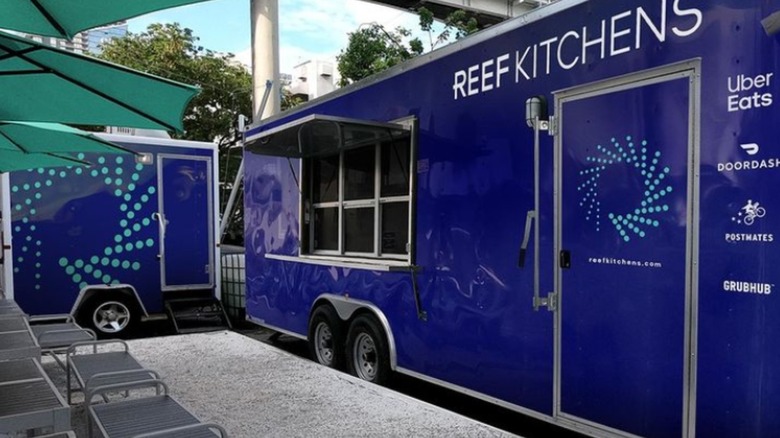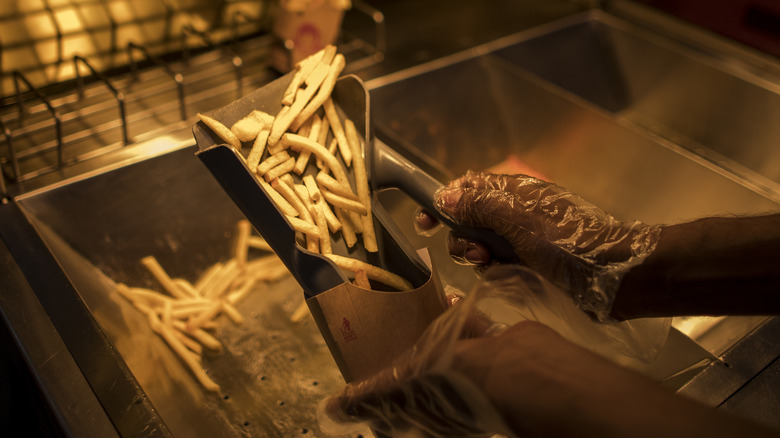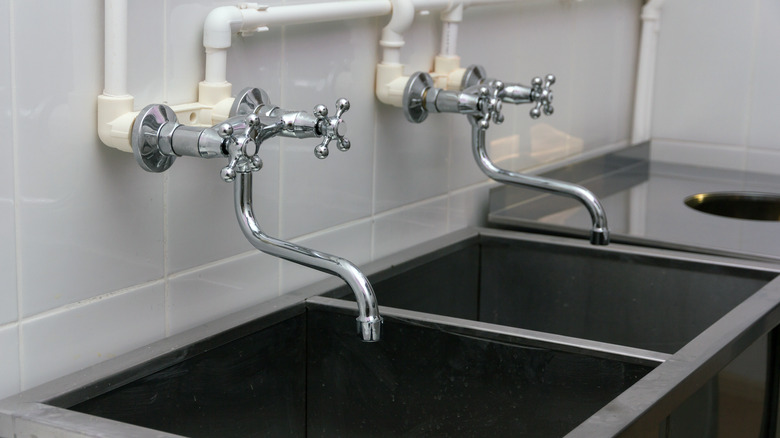Why This Ghost Kitchen Keeps Finding Itself In Legal Trouble
Until the coronavirus pandemic kept us in our homes last year, many of us hadn't heard about ghost kitchens. Today, thanks to a COVID-19 driven surge in delivery services, ghost kitchens have become The Next Big Thing in the food and beverage industry, so much so that industry players have seen investments of more $3.5 billion poured into the sector (via The Wall Street Journal).
Ghost kitchens (they're also known as "dark kitchens or delivery-only kitchens," per CloudKitchens) are the food prep centers you've never seen, manned with service staff you've never met, prepping and cooking dishes that you are probably very familiar with, particularly if you've been ordering out a lot. Think of a ghost kitchen as a cooking hub, where a group of restaurants or entertainment brands end up operating out of the same culinary space.
Because ghost kitchens don't have shopfronts, they can operate in areas where the rents are lower — like in industrial parks, outside downtown or urban areas (via The Conversation). But while some ghost kitchen operators are happy to share a commercial facility within a large industrial space, Reef Kitchens has an altogether different operating model, one that has triggered alleged problems its eager owners and operators either reportedly overlooked — or chose to ignore.
Some Reef vessels operated without permits
Reef Technology wasn't always in the business of operating ghost kitchens. Before the pandemic, the company was known as ParkJockey, which managed an estimated 5,000 parking lots and structures across North America. When the coronavirus pandemic hit, those parking spaces, which are located in major cities across the continent, morphed into home base for what Nation's Restaurant News says is "a fleet of 5,000-plus" trailers, which they call "vessels" and which resemble modular cooking spaces. Think of them as food trucks that don't move and don't serve customers directly, but rather, fulfill delivery orders for big restaurants. Today, Reef has contracts with Wendy's, Del Taco, TGI Friday's, Bennigan's, and many more.
Because they technically operate within the food and beverage space, Reef's vessels are meant to be governed by the same laws that oversee the operation of any food preparation facility. This means taking out permits, which puts them under the jurisdiction of food safety officials in the cities in which they operate. But thanks to what Reef sees as a legal loophole, this permitting has not always happened, according to Insider.
Reef Kitchens says it isn't exactly its fault. As one spokesman put it, "The existing permitting frameworks never contemplated our mobile and modular model. As we wait for cities to catch up, we continue to work closely with local regulators to ensure that we operate safely and in full compliance with local regulations" (via Insider). Permit issues, however, aren't Reef's only legal woes.
Many Reef vessels have been shut down for violations
The lack of proper oversight for Reef's ghost kitchens has reportedly had sanitation and safety consequences. Former workers at Reef's vessels in Houston, Chicago, and New York told Insider that a lack of clean water was a consistent problem, which not only prevented them from preparing foods properly, but also from being able to appropriately clean their cooking implements. The same outlet reported that food inspectors in Chicago ordered "immediate shutdowns" of six Reef vessels after inspection failures, including one with the violation of "inadequate water source for clean potable water."
Water problems aside, three former employees from three different vessels claim to have been seriously injured by propane units that allegedly created a "fireball" inside the modular kitchens in Houston and San Francisco, according to The Wall Street Journal. That report also stated since the Summer of 2021 alone, authorities enforcing permitting and regulatory requirements in New York City, Houston, Detroit, Chicago, Philadelphia, and Minneapolis "have suspended operations at some or all of Reef's fleets of trailers for violating regulations, totaling more than 25 closures."
For its part, Reef Kitchens told told Insider that "the health and safety of [its] employees and customers" is its "top priority." The start-up has also reportedly taken steps to remedy the propane fireball problem. As for the permit issue, a Reef spokesman claimed that the company seeks permits wherever necessary, but reiterated that because of "gaps in our model and existing permitting structures ... there is more work to be done and we can do better."


